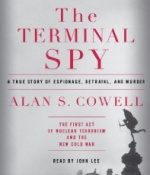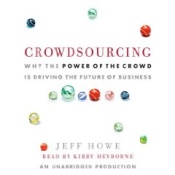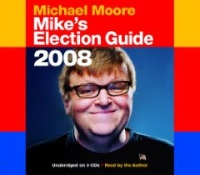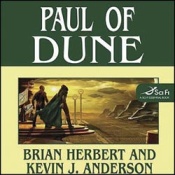October 2008
AUDIO BOOK REVIEWS
by Jonathan Lowe
 London. Nov. 1, 2006. New York Times
bureau chief Alan S. Cowell, although
he doesn't know it yet, is about to
cover the events leading up to the poisoning
death of a former KGB intelligence officer
known for his criticisms of President
Vladimir Putin. Sound like a spy thriller?
It is, but it's not fiction, and now
Cowell has gone on to chronicle the
entire back story in his new book THE
TERMINAL SPY, which follows Alexander
Litvinenko throughout his insider career
in the 1990s with other spies and sanctioned
Russian thugs. Cowell explains why a
rare radioactive isotope known as polonium
was the preferred weapon of assassinations
by the Kremlin—primarily for its
resistance to detection and short half-life.
One speck in food will kill within days,
then be flushed from the body, while
inflicting excruciating pain. It was
only by accident that Litvinenko's dose
was discovered, while his approved killer
escaped prosecution so that diplomats
could save face. Narrated by the always
engaging actor John Lee, whose accented
performance is especially appropriate
here, the audiobook confirms suspicions
that sometimes, at least, real life
can be just as intriguing as those spy
thrillers on the big screen. (Random
House Audio; 6 1/2 hours abridged)
London. Nov. 1, 2006. New York Times
bureau chief Alan S. Cowell, although
he doesn't know it yet, is about to
cover the events leading up to the poisoning
death of a former KGB intelligence officer
known for his criticisms of President
Vladimir Putin. Sound like a spy thriller?
It is, but it's not fiction, and now
Cowell has gone on to chronicle the
entire back story in his new book THE
TERMINAL SPY, which follows Alexander
Litvinenko throughout his insider career
in the 1990s with other spies and sanctioned
Russian thugs. Cowell explains why a
rare radioactive isotope known as polonium
was the preferred weapon of assassinations
by the Kremlin—primarily for its
resistance to detection and short half-life.
One speck in food will kill within days,
then be flushed from the body, while
inflicting excruciating pain. It was
only by accident that Litvinenko's dose
was discovered, while his approved killer
escaped prosecution so that diplomats
could save face. Narrated by the always
engaging actor John Lee, whose accented
performance is especially appropriate
here, the audiobook confirms suspicions
that sometimes, at least, real life
can be just as intriguing as those spy
thrillers on the big screen. (Random
House Audio; 6 1/2 hours abridged) |
 Next, John Keller is a hit man who collects
stamps. Odd, you might say, for a man
you might associate with being a sociopath.
But is Keller really without scruples?
In HIT AND RUN by award winning mystery
writer Lawrence Block, the case is made
for a hit man possessing endearing qualities.
For the purposes of reader identification,
this is a useful presumption, too, since
it would be more difficult to root for
someone who might slit your throat for
no good reason. Keller usually has a
good reason, and not just because he's
being paid. The victims usually "deserve"
what they get. That is, they are usually
killers themselves. In this latest installment,
Keller has been set up by his employer
to take the fall for a political murder
he didn't do, and must disappear before
the police find him. He eventually travels
to New Orleans, where he attempts to
live a normal life with a construction
job and even a girlfriend. With his
stamp collection presumably stolen and
his intriguing secretary "Dot" out of
the loop, Keller bides his time until
the expected moment of revenge presents
itself, when his old life may (or may
not) resume. Has Keller finally retired,
as he intended? Judge for yourself.
Your guess is as good as mine. The plot
is not the important thing here. In
fact, there's not much plot at all.
The attraction is in hearing about the
day to day mundane activities of a man
with a job we wouldn't consider doing.
Unless we were sociopathic. Block walks
that tightrope even more believably
with the talents of narrator and actor
Richard Poe, who gives the understated
performance required by the text, and
who crosses into dramatic, accented
speech only at those moments involving
confrontation, whether droll or action
oriented. Poe is good, and he has Keller's
mindset down pat, and conveys that to
the audience. Is there a John Keller
out there somewhere in real life? Perhaps,
but he's certainly not the norm. You
wouldn't be as curious about him if
he was typical, either. (Recorded
Books; 8.5 hours unabridged)
Next, John Keller is a hit man who collects
stamps. Odd, you might say, for a man
you might associate with being a sociopath.
But is Keller really without scruples?
In HIT AND RUN by award winning mystery
writer Lawrence Block, the case is made
for a hit man possessing endearing qualities.
For the purposes of reader identification,
this is a useful presumption, too, since
it would be more difficult to root for
someone who might slit your throat for
no good reason. Keller usually has a
good reason, and not just because he's
being paid. The victims usually "deserve"
what they get. That is, they are usually
killers themselves. In this latest installment,
Keller has been set up by his employer
to take the fall for a political murder
he didn't do, and must disappear before
the police find him. He eventually travels
to New Orleans, where he attempts to
live a normal life with a construction
job and even a girlfriend. With his
stamp collection presumably stolen and
his intriguing secretary "Dot" out of
the loop, Keller bides his time until
the expected moment of revenge presents
itself, when his old life may (or may
not) resume. Has Keller finally retired,
as he intended? Judge for yourself.
Your guess is as good as mine. The plot
is not the important thing here. In
fact, there's not much plot at all.
The attraction is in hearing about the
day to day mundane activities of a man
with a job we wouldn't consider doing.
Unless we were sociopathic. Block walks
that tightrope even more believably
with the talents of narrator and actor
Richard Poe, who gives the understated
performance required by the text, and
who crosses into dramatic, accented
speech only at those moments involving
confrontation, whether droll or action
oriented. Poe is good, and he has Keller's
mindset down pat, and conveys that to
the audience. Is there a John Keller
out there somewhere in real life? Perhaps,
but he's certainly not the norm. You
wouldn't be as curious about him if
he was typical, either. (Recorded
Books; 8.5 hours unabridged) |
 CROWDSOURCING was coined by journalist
Jeff Howe in the June 2006 issue of
Wired magazine to describe the
phenomenon of non-professional contributions
to formerly professionally dominated
industries. Although no one expects
those who frequent social websites,
(endlessly swapping photos and songs
and videos), to put doctors and lawyers
out of business anytime soon, Howe makes
the case, in his book subtitled WHY
THE POWER OF THE CROWD IS DRIVING THE
FUTURE OF BUSINESS, that the contributions
of ordinary citizens to the creative
side of free enterprise is already putting
many professionals out of work. His
primary case study is iStockPhoto.com,
a company which licenses stock photography
via the internet at a much cheaper rate
than professional stock photographers,
or Getty Images. Anyone can submit their
photos, and if accepted, can begin to
earn royalties on them. The same is
true for Threadless.com tee shirts,
whose designs are crowdsourced, voted
on by peers, and then sold to the very
people who frequent the site. Of course
the biggest model for crowdsourcing
is Google, which ranks pages by how
often people quote or link to them.
And while Current.com collects news
stories from amateurs, YouTube attempts
to bypass mainstream media altogether
by making anyone a "reporter." Certainly
these trends are commendable in many
ways, opening doors to innovation and
increased productivity, since not even
scientists have time to sift through
all the data collected by giant telescopes,
looking for asteroids or signals from
intelligent civilizations. But if this
new meritocracy were to expand, would
it not give false hope to those considering
whether or not to attend grad school?
If I've got an advanced degree in thermodynamic
engineering, and I'm driving a cab,
I'll have a better chance of contributing
to an alternative energy startup company
(that crowdsources) than someone who
has been washing dishes in a diner all
his life. Rather than seeing this trend
as empowering the masses, it is therefore
better to view it as an opportunity
for unrecognized talent to come forward.
Still, an interesting discussion all
around, as narrated by actor Kirby Heyborne,
who is moonlighting here from feature
films and television series. (Random
House Audio; 10 hours unabridged)
CROWDSOURCING was coined by journalist
Jeff Howe in the June 2006 issue of
Wired magazine to describe the
phenomenon of non-professional contributions
to formerly professionally dominated
industries. Although no one expects
those who frequent social websites,
(endlessly swapping photos and songs
and videos), to put doctors and lawyers
out of business anytime soon, Howe makes
the case, in his book subtitled WHY
THE POWER OF THE CROWD IS DRIVING THE
FUTURE OF BUSINESS, that the contributions
of ordinary citizens to the creative
side of free enterprise is already putting
many professionals out of work. His
primary case study is iStockPhoto.com,
a company which licenses stock photography
via the internet at a much cheaper rate
than professional stock photographers,
or Getty Images. Anyone can submit their
photos, and if accepted, can begin to
earn royalties on them. The same is
true for Threadless.com tee shirts,
whose designs are crowdsourced, voted
on by peers, and then sold to the very
people who frequent the site. Of course
the biggest model for crowdsourcing
is Google, which ranks pages by how
often people quote or link to them.
And while Current.com collects news
stories from amateurs, YouTube attempts
to bypass mainstream media altogether
by making anyone a "reporter." Certainly
these trends are commendable in many
ways, opening doors to innovation and
increased productivity, since not even
scientists have time to sift through
all the data collected by giant telescopes,
looking for asteroids or signals from
intelligent civilizations. But if this
new meritocracy were to expand, would
it not give false hope to those considering
whether or not to attend grad school?
If I've got an advanced degree in thermodynamic
engineering, and I'm driving a cab,
I'll have a better chance of contributing
to an alternative energy startup company
(that crowdsources) than someone who
has been washing dishes in a diner all
his life. Rather than seeing this trend
as empowering the masses, it is therefore
better to view it as an opportunity
for unrecognized talent to come forward.
Still, an interesting discussion all
around, as narrated by actor Kirby Heyborne,
who is moonlighting here from feature
films and television series. (Random
House Audio; 10 hours unabridged) |
 Michael Moore, having witnessed the
defeat of Al Gore and other Democratic
Presidential contenders in the past,
is understandably more than a bit paranoid
about the prospect of losing an election
that should be "a slam dunk." In his
new, short audiobook (that he narrates
himself with both self-deprecating humor
and real emotional urgency) Moore wonders
aloud how Democrats will manage to blow
it this time. He even offers the party
advice on how to blow it again, just
before advising Obama what to do during
his first weeks in office. Is he serious?
You bet. About as serious as a fat man
on a high wire over a river filled with
piranha can be. The humor here may be
gallows in MIKE'S ELECTION GUIDE 2008,
as he provides prefabricated statements
"to be taken out of context by the press,"
but while the audiobook is mostly an
audio blog, Moore is also unafraid to
ask the un-askable. For example, he
asks McCain about whether he thinks
bombing targets in Vietnam "where civilians
were present" was the courageous thing
to do. "Mr. McCain," he says, "your
answer, please." (Hachette Audio;
3 hours unabridged)
Michael Moore, having witnessed the
defeat of Al Gore and other Democratic
Presidential contenders in the past,
is understandably more than a bit paranoid
about the prospect of losing an election
that should be "a slam dunk." In his
new, short audiobook (that he narrates
himself with both self-deprecating humor
and real emotional urgency) Moore wonders
aloud how Democrats will manage to blow
it this time. He even offers the party
advice on how to blow it again, just
before advising Obama what to do during
his first weeks in office. Is he serious?
You bet. About as serious as a fat man
on a high wire over a river filled with
piranha can be. The humor here may be
gallows in MIKE'S ELECTION GUIDE 2008,
as he provides prefabricated statements
"to be taken out of context by the press,"
but while the audiobook is mostly an
audio blog, Moore is also unafraid to
ask the un-askable. For example, he
asks McCain about whether he thinks
bombing targets in Vietnam "where civilians
were present" was the courageous thing
to do. "Mr. McCain," he says, "your
answer, please." (Hachette Audio;
3 hours unabridged) |
 Finally, the epic SF classic
DUNE ended with Paul Muad'Dib in
control of spice mining on the desert
planet, having defeated the forces of
House Harkonen. Frank Herbert's sequel,
DUNE MESSIAH, takes up years later,
after Paul's armies have conquered the
galaxy. The period between these two
books has been left unexplored, until
now, with PAUL OF DUNE, by Herbert's
son Brian, and Kevin J. Anderson. The
duo have previously explored other timelines
surrounding Dune, but here they focus
on the reign of conquest in which Paul
leads his legions from victory to victory
while both self doubts and internal
conflicts threaten to undermine him.
Attempts are here made on Paul's life,
and loyalties are questioned, leading
to harsh consequences that bring up
the old question, "Does absolute power
corrupt absolutely?" Read by Dune universe
insider Scott Brick, who is quite familiar
with all the requisite pronunciations,
the novel is a must for Dune fans, and
anyone else into space opera. For those
whose suspension of disbelief doesn't
extend to Star Wars, and the
clash of epic egos in space so vast
that even Darth Vader is a grain of
sand on some distant beach, might I
suggest the clash to be resolved on
Nov. 2? Perhaps not, but at least things
will be in better perspective after
hearing this audiobook. (MacMillan
Audio; 18 1/2 hours unabridged)
Finally, the epic SF classic
DUNE ended with Paul Muad'Dib in
control of spice mining on the desert
planet, having defeated the forces of
House Harkonen. Frank Herbert's sequel,
DUNE MESSIAH, takes up years later,
after Paul's armies have conquered the
galaxy. The period between these two
books has been left unexplored, until
now, with PAUL OF DUNE, by Herbert's
son Brian, and Kevin J. Anderson. The
duo have previously explored other timelines
surrounding Dune, but here they focus
on the reign of conquest in which Paul
leads his legions from victory to victory
while both self doubts and internal
conflicts threaten to undermine him.
Attempts are here made on Paul's life,
and loyalties are questioned, leading
to harsh consequences that bring up
the old question, "Does absolute power
corrupt absolutely?" Read by Dune universe
insider Scott Brick, who is quite familiar
with all the requisite pronunciations,
the novel is a must for Dune fans, and
anyone else into space opera. For those
whose suspension of disbelief doesn't
extend to Star Wars, and the
clash of epic egos in space so vast
that even Darth Vader is a grain of
sand on some distant beach, might I
suggest the clash to be resolved on
Nov. 2? Perhaps not, but at least things
will be in better perspective after
hearing this audiobook. (MacMillan
Audio; 18 1/2 hours unabridged) |
|